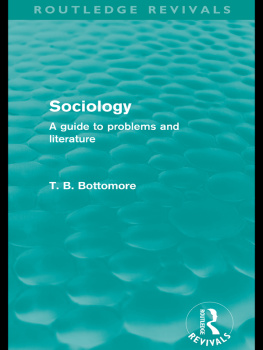ROUTLEDGE LIBRARY EDITIONS:
SOCIAL THEORY
Volume 47
THE NORMATIVE STRUCTURE OF SOCIOLOGY
THE NORMATIVE STRUCTURE OF SOCIOLOGY
Conservative and emancipatory themes in social thought
HERMANN STRASSER
First published in 1976
This edition first published in 2015
by Routledge
2 Park Square, Milton Park, Abingdon, Oxon OX14 4RN
and by Routledge
711 Third Avenue, New York, NY 10017
Routledge is an imprint of the Taylor & Francis Group, an informa business
1976 Hermann Strasser
All rights reserved. No part of this book may be reprinted or reproduced or utilised in any form or by any electronic, mechanical, or other means, now known or hereafter invented, including photocopying and recording, or in any information storage or retrieval system, without permission in writing from the publishers.
Trademark notice: Product or corporate names may be trademarks or registered trademarks, and are used only for identification and explanation without intent to infringe.
British Library Cataloguing in Publication Data
A catalogue record for this book is available from the British Library
ISBN: 978-0-415-72731-0 (Set)
eISBN: 978-1-315-76997-4 (Set)
ISBN: 978-1-138-79061-2 (Volume 47)
eISBN: 978-1-315-76378-1 (Volume 47)
Publishers Note
The publisher has gone to great lengths to ensure the quality of this reprint but points out that some imperfections in the original copies may be apparent.
Disclaimer
The publisher has made every effort to trace copyright holders and would welcome correspondence from those they have been unable to trace.
The normative structure of sociology
Conservative and emancipatory themes in social thought
Hermann Strasser
Routledge & Kegan Paul
London, Henley and Boston
First published in 1976
by Routledge & Kegan Paul Ltd
76 Carter Lane, London EC4V 5EL,
Reading Road
Henley-on-Thames
Oxon RG9 1EN and
9 Park Street
Boston, Mass. 02108, USA
Photoset in 10 on 11 Times by Thomson Press (India) Limited,
New Delhi
and printed in Great Britain by
Redwood Burn Ltd. Trowbridge & Esher
Hermann Strasser 1976
No part of this book may be reproduced in
any form without permission from the
publisher, except for the quotation of brief
passages in criticism
ISBN 0 7100 8166 9 (C)
0 7100 8167 7 (P)
Contents
This study represents an expression of uneasiness with respect to the ways sociological theories are constructed and different kinds of sociological theories are analyzed. My device to reduce such negative feelings is based on the assumption that all social theorizing functions, intentionally or not, to conceptualize and classify social facts, to explain them, and to exercise a judging influence on them. Therefore, an attempt is made, first, to develop a paradigm that takes those three functions or steps of social theorizing into account. And second, employing the paradigm in the analysis of developments in sociological theory, one should discover that conceptual and explanatory models cannot escape from being affected by normative considerations. But the question is not only whether the normative perspective is to be regarded as part of the theoretical enterprise, but also what consequences normatively infused theories have. The consequences incurred, of course, do not depend on the stated goals of the respective authors, but on the social and epistemological context within which their theories are expounded.
A special word of appreciation must go to Professor Werner Stark. His untiring encouragement, generous consideration and valuable criticism were instrumental in motivating the completion of this study. To him and his wife, Kate, I owe a great deal. I should also like to take this opportunity to thank my friends at Fordham University, the University of Oklahoma and the Institute for Advanced Studies, Vienna, who made many things possible. I am also grateful to Lewis A. Coser, Friedrich Frstenberg, Alvin W. Gouldner, Sigurd Hllinger, Paul Kellermann, Niklas Luhmann, Peter Posch, Susan C. Randall, Robert Reichardt, John Rex and Leopold Rosenmayr for critical comments and interest in my work. Mrs Eva Paulus must be given credit for doing a splendid job in converting my scribblings into neat, typewritten pages. I would also like to commend the staff of Routledge & Kegan Paul for their conscientious support. Finally, I am deeply indebted to my wife, Gudrun, for the most precious contribution to my work: understanding.
Hermann Strasser
Acknowledgments are due to the following for permission to reproduce copyright material: Basic Books and Heinemann (A.W. Gouldner, The Coming Crisis of Western Sociology, 1970 by Alvin W. Gouldner, Basic Books Inc.); Collier-Macmillan (K.H. Wolff, ed., The Sociology of Georg Simmel, Copyright The Free Press, 1949, 1954); Duncker & Humblot (G. Simmel, Soziologie); Edinburgh University Press (A. Ferguson, An Essay on the History of Civil Society), Harvard University Press (T. Parsons and E.A. Shils, eds, Toward a General Theory of Action); Humanities Press and Routledge & Kegan Paul (H. Marcuse, Reason and Revolution); Macmillan, NY (T. Parsons, Essays in Sociological Theory and The Structure of Social Action, Copyright, the Free Press, 1949; T. Parsons et al., eds, Theories of Society, 1, Copyright 1961 by the Free Press; G. Simmel, Conflict and the Web of Group Affiliations, Copyright 1955 by the Free Press); Macmillan, NY, and Routledge & Kegan Paul (L.A. Coser, The Functions of Social Conflict, Copyright , the Free Press 1956; Patterns of Industrial Bureaucracy, Copyright 1954 by the Free Press; T. Parsons, The Social System, Copyright 1951 by Talcott Parsons); Pitman (T. Bottomore, ed., Karl Marx: Early Writings, originally published by C.A. Watts); Reidel and the author (J. Galtung, Empiricism, criticism, constructivism: three approaches to scientific activity); Vsesojuznoje Agentstvo po Avtorskim Pravam (K. Marx and F. Engels, Selected Works, I and II).
Many sociologists have defined sociology as an empirically-oriented science that is directed toward the future. Sociology should not be identified with, and legitimated by, authorities or dogmas. The sociological discipline, we are told, is not a mausoleum of names and doctrines, but rather an institution whose purpose is to attempt to explain and to solve those problems that this discipline encounters here and now.
This poses the question of the tasks of sociology. As an empirical science, sociology is supposed to adhere to the methodological rules of empirico-theoretical systems from which propositions and theories are to be formed. Scientific sociology not only rejects the assumption that the sociological enterprise should rest on some valuative presupposition, but also accepts the idea that sociology should take a neutral stand on the political consequences its findings might have in social practice. It is conceded, however, that the political relevance of their practical impact may become an object of study ex post facto. At best, the positivistic model of science leaves the sociologist to his double role as citizen and scientist, whereby he may






